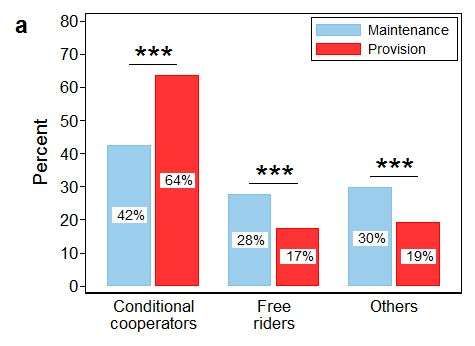Higher levels of cooperation for provision than for maintenance of public goods

Dr. Felix Koelle, a research fellow at the Faculty of Management, Economics, and Social Sciences at the University of Cologne, led a team studying how the paradigm of reciprocity influences public goods. Participants (n = 876) in a series of experiments and simulations were asked to either maintain a public good or create a new one. Examples for the maintenance of public goods are sustaining natural resources like water, limiting CO2 emissions and fostering biodiversity. Examples for the provision of public goods are engagement in political activities, charity and volunteering.
The participants showed higher levels of cooperation with regard to the provision of new public goods than with regard to the maintenance of existing ones. 'Our findings are consistent with the observation that failing to contribute to public good is judged more morally blameworthy than exploiting an existing public good,' says Felix Koelle, embedding the project results in the research field of Economics Design and Behavior.
The research team was able to identify two different types of cooperation. The majority of participants exhibited conditional cooperation. They were only willing to cooperate if other participants did so, as well. The second group, so-called 'free riders,' never participated in the maintenance or provision of public goods—no matter if others did. Participants were less likely to cooperate conditionally and more likely not to cooperate at all when they were exposed to a dilemma about maintaining a public good.
The research results have potential implications for policy proposals aiming for more cooperation with regard to public goods. Policymakers should be aware that willingness to cooperate varies strongly depending on the kind of public good at stake.
More information: Simon Gächter et al, Reciprocity and the tragedies of maintaining and providing the commons, Nature Human Behaviour (2017). DOI: 10.1038/s41562-017-0191-5
Journal information: Nature Human Behaviour
Provided by University of Cologne
















